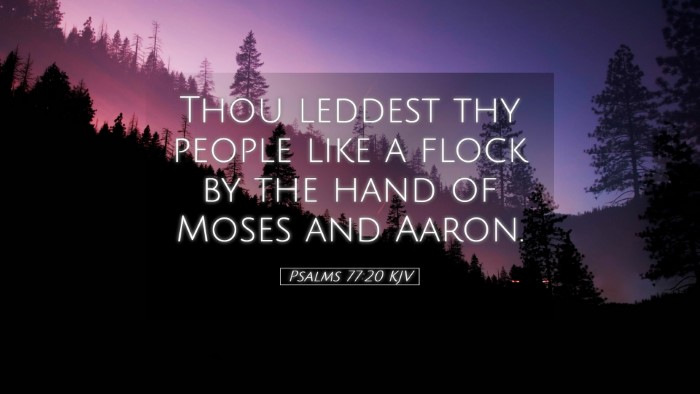Commentary on Psalms 77:20
Bible Verse: "Thou leddest thy people like a flock by the hand of Moses and Aaron."
Introduction
The verse Psalm 77:20 presents a profound reflection on God's guidance and leadership. It evokes imagery of pastoral care, illustrating how God guides His people as a shepherd does with his flock. This commentary endeavors to explore the depth of this verse through insights from esteemed public domain commentaries, namely those by Matthew Henry, Albert Barnes, and Adam Clarke.
The Context of Psalm 77
Psalm 77 is attributed to Asaph, a prominent Levite and worship leader in Israel. The psalm begins with Asaph expressing his anguish and sorrow, mourning over what appears to be God's abandonment during troubling times. Yet, amidst his lament, he arrives at the crucial realization of God's past acts of deliverance.
Overview of the Psalm
- Verses 1-3: Introduction to Asaph's Distress.
- Verses 4-9: Asaph recalls his troubles, questioning God's intentions.
- Verses 10-15: Asaph remembers God's deeds of old, turning from despair to hope.
- Verses 16-20: A climactic acknowledgment of God’s delivering nature through historical references.
Insights on Psalm 77:20
God's Leadership
Matthew Henry's Commentary: Matthew Henry emphasizes the metaphor of God leading His people as "a flock." This imagery denotes not just guidance but also care, protection, and provision. Henry suggests that God’s leadership is both firm and compassionate, exemplified in the journeys of Moses and Aaron, who led the Israelites out of Egyptian bondage and through the wilderness.
Albert Barnes’ Commentary: Barnes elaborates by highlighting that the leadership of Moses and Aaron indicates God's commitment to His people. He notes that their leadership was not merely a human endeavor but a divine orchestration meant to fulfill God’s covenant and promises to His people.
Historical References
Adam Clarke's Commentary: Adam Clarke draws attention to the historical narrative where God uses Moses and Aaron as instruments of His will. Clarke cites the Exodus as an essential backdrop to this verse, illustrating how God intervened in human history for the sake of His people. He indicates that the "leading" mentioned is a direct reference to the deliverance from Egypt, symbolizing hope and restoration.
Theological Implications
The verse presents several theological themes significant for pastors, students, and scholars:
- Divine Providence: The imagery showcases God's sovereignty over His people, guiding them through trials and tribulations.
- Community and Leadership: It highlights the importance of godly leadership within the community of faith, demonstrating how God raises leaders to fulfill His purpose.
- Memory and Remembrance: Asaph’s recollection invites believers to remember God's faithfulness in the past, encouraging trust in God during current struggles.
Application for Believers
This verse is rich in its application for contemporary believers. In moments of distress, believers are called to recall how God has previously led and provided for His people. This reflection nourishes faith and inspires confidence in God's everlasting presence.
Encouragement in Trials
Pursuing Henry's emphasis, pastors might find comfort in reminding congregants that, like the Israelites led by God, they too are not abandoned in their wilderness. The assurance that God "leads" suggests active involvement and not mere oversight.
Call to Leadership
For church leaders, this verse serves as a reminder of their sacred duty to lead God’s people with a shepherd's heart. They are called to exercise both authority and compassion. Such leadership model reflects Biblical principles, echoing the dual role evident in Moses and Aaron's ministry.
Conclusion
Psalms 77:20 encapsulates a historical and theological depth that continues to resonate with believers. It serves as a reminder of God’s guiding hand through challenging seasons, affirming His faithfulness and nurturing community under His care. The insight from public domain commentaries enriches our understanding, encouraging an ongoing dialogue about God’s character and His purposes for His people.


